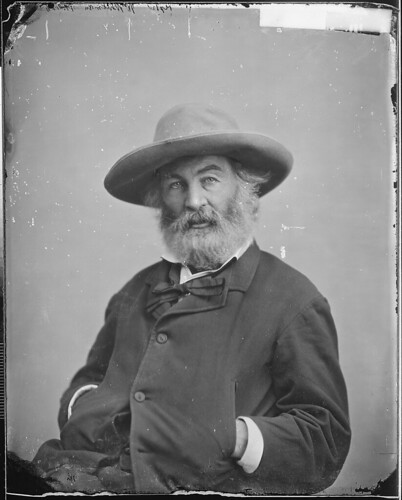Walt Whitman is a very
well-known poet in American Society. He is said to be the father of free-verse, even though he did not create it (4). He
is well-known for writing many poems that are related to different issues. One of these issues that he wrote about was death, “O Captain!
My Captain”. Another issue he wrote about was singing, “I Hear America Singing”. His poems really seem to
liven up the senses and make you feel as if you can taste what is going on in
his poetry. What a few may not know,
however, is that Whitman’s poetry is very controversial in past society and in
present society. Included in these
topics is the topic of homosexuality, the infatuation with same-sex relationships. He was indeed the first poet to publicly touch the theme (2). It is still debatable if the poems about
these topics should even be read even. However, they most certainly are read today.
It has been argued many times that Whitman was bisexual
or a homosexual. He was rumored to have
a relationship with a man named Peter
Doyle. Doyle was a bus driver and the two men were inseparable for years. Doyle once made a claimed that he still had”the kiss of Walt Whitman still on his
lips," (4) which made the rumor appear to be true. Whitman also wrote
of many men that he had “slept with” in
his notebooks (7). From some of his
poems, it seemed that Whitman envisioned
a world where same-sex was allowed (1).
Something that Whitman is most famous for writing is a
book of poems entitled “Leaves of Grass”.
He spent his whole life reediting
the book, never finding it completely perfect. This
book was soon appraised by Emerson, which helped gain him publicity. Whitman gave the two relationships in the
book the names, “amativeness" for
man-woman love and "adhesiveness" for "manly love". In this book he taught that the body is beautiful, and that sex is
beautiful (3). However though this book received praise from a few authors,
it was very disliked all
around. People called the book "trashy, profane & obscene” due to
the sexual theme (4). In this book,
Whitman defined sex as an “essential spiritual
experience” (3). Many of these poems held the same sexual ideas, such as in
“A Woman Waits for Me”. The word “sex” is counted in this poem numerous
times (8). One poem, “We Two Boys”, describes the two same-sexed figures to be holding
hands and cuddling (5). In “Calamus”,
Whitman uses the calamus acornus plant to symbolize gay love (7). A few more
poems, unfortunately, even go into more detail expressing what some would even
call “pornographic literature”.
During
the Civil War times, homosexuality was considered a “vile disease”. From my knowledge, I know that many
homosexual men were locked up in insanity areas or even sometimes killed. However, he was unashamed of this fact, and
stated that this “germ” lived in every breast” in the human body (6). Today, homosexuality
has begun to become more accepted in society (2). This may be credited to Whitman’s works. It has come a long way from Civil War times.
Sources
Pictures
(2) https://blogger.googleusercontent.com/img/b/R29vZ2xl/AVvXsEhYEQ0D5ThZ-XdActldRoJTIuriEHSSKOWJDNtb-2lgiCY7fVUAiDze4s1_jIlRJPtRWdrbyUFAE6KM8Tq0afCowolP9geY6hAWvKDXq7okzUAWlJAm6uYv0H5glerx0YzGJ46q7Ov-JC7w/s400/0194545001234348430-duas-imaxe-empregadas-polo-bloco-de-esquerda-na-sua-campana-pola-legalizacion-do-casamento-homosexual.jpg
(4) http://mrpi.utsa.edu/images/images2/Image84.gif




No comments:
Post a Comment